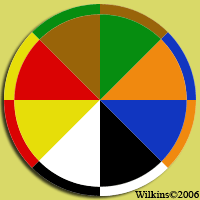| Home | ||
|---|---|---|
Gods & Myths |
||
There are eight gods in the Kius pantheon, each with a unique function and is represented by a particular color. The first two: the God of Creation and the Goddess of Life are the embodiments of all things in existence and are represented by brown and green respectively. They are the parents of three sets of twins - the Goddess of Fire and God of Water (orange and blue); the God of Death and the Goddess of Children (black and white); and the Goddess of Plants and the God of Animals (yellow and red).

Wheel of the Gods
Each deity is balanced by their counter-part and no action can be taken by one without a counter action by the other. This way the world - and the life on it - remains in balance.
More information on the Gods and Goddess are as follows:
God of Creation (Eko Egash - pronounced: ee-ko ee-gash)
Element: Earth
Color: Brown
Counterpart: Goddess of Life
Time of Day: Sunrise
The God of Creation is in charge of all soil, rocks and non-living things. He guides new beginnings and is the guardian of travelers. He is the creator of words and math and gave the Kiuses their alphabet. His instrument is the clay drum.
Goddess of Life (Ele Patash: ee-lee pa-tash)
Element: Air
Color: Green
Counterpart: God of Creation
Time of Day: Sunset
The Goddess of Life watches over all living things. Her presence is strongest among young plants and animals, newly married couples and people in love. She is the guardian of midwives and taught Kiuses the healing arts. She is also keeper of poetry, song and wind instruments.
Goddess of Fire (Ele Dasa: ee-lee da-sa)
Element: Fire
Color: Orange
Counterpart: God of Water
Time of Day: Noon
The Goddess of Fire is responsible for keeping the sun on its track across the sky. It is believed that every evening the sun goes out as it sinks behind the horizon to be relit again with the new day. She controls the West and North Winds.
She is drawn to all things beautiful as she, herself is believed to be the most lovely of all the deities. She is known for being impulsive and impatient. She is the patron of dance and her instrument is the fire flute.
God of Water (Eko Mage: ee-ko ma-gee)
Element: Water
Color: Blue
Counterpart: Goddess of Fire
Time of Day: Midnight
The God of Water is the keeper of the sky and all things in it. He is the one who brings rain and clouds and controls the South and East Winds. He is slow to anger and is quieter than his twin sister. He taught the Kiuses what fish were good to eat and how to make fishing spears and nets. His instruments are the water drum and the water pipes.
God of Death (Eko Kapana: ee-ko ka-pa-na)
Element: Mist and smoke
Color: Black
Counterpart: Goddess of Children
Time of Day: Sunset-Midnight
The God of Death is known for his compassion for those suffering and in pain. It is believed that to look into his eyes is to go with him willingly along the Moon Path. He is a quiet, contemplative god and the Kiuses don't really fear him as much as respect his role in the cycle of Life. His instrument is the bayhava.
Goddess of Children (Ele Koakto: ee-lee ko-ak-to)
Element: Molten Rock
Color: White
Counterpart: God of Death
Time of Day: Sunrise-Noon
The Goddess of Children watches over pregnant women, child birth, babies and children until they receive their adult name. She is a happy, robust goddess who invented childhood games, stories and songs. Her instrument is the gourd rattle.
Goddess of Plants (Ele Putu: ee-lee poo-too)
Element: Wood
Color: Yellow
Counterpart: God of Animals
Time of Day: Noon-Sunset
Also sometimes known as the Goddess of the Harvest (Ele Keutush: kee-oo-toosh), she watches over all plants. She is keeper of all domestic arts and taught the Kiuses how to plant crops and gave to them tools for sowing and harvesting. She also gave the People the grinding stone for making flour. She is patron of weavers and is guardian of the home and all things in it. She is a quiet, patient teacher who passes on her wisdom through gentle practice and observation. Her instrument is wood beat-sticks.
God of Animals (Eko Anhepa: ee-ko an-hee-pa)
Element: Bone
Color: Red
Counterpart: Goddess of Plants
Time of Day: Midnight-Sunrise
Sometimes known as the God of the Hunt (Eko Teshmea: teesh-mee-ah), he is keeper of all animals. He is patron of the hunter and is a strong, athletic god who is known for his occasional bursts arrogance and brashness. He gave the Kiuses all tools for hunting and taught them how to stalk and kill prey with honor as well as how to properly prepare meat to be eaten. His domain is the outdoors - any place outside of the village. He invented all games of skill and cunning. His instrument is the hand drum.